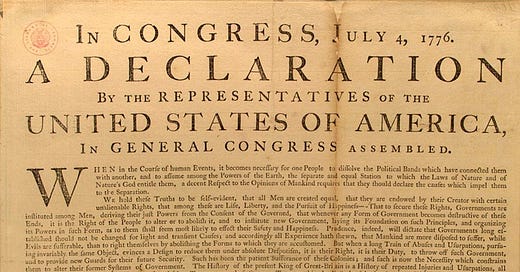A Big Tent is Not a Universal Shelter: The Utopian Spirit
America is jettisoning the spiritual realm and seeking completeness solely in ethics—at precisely the moment that utopians are moving in the other direction. Danger lies ahead.
The American Spirit Essays #16
(continued from The Morality of Abundance)
Critical Theory
Gramsci was among the first important Marxists to notice the spiritual shortcoming at the heart of his faith. His writings gave birth to cultural Marxism, relegating the original to economic, or class-based Marxism. Marxist scholars throughout the twentieth century broadened the analysis even further, giving birth to Critical Theory. Critical Theory is little more than generalized Marxism. Whereas Marx reduced all of history to the struggle between economic classes, Critical Theorists reduce all of history to struggles between rigidly defined groups. Marx contended that the resource-owning class sought uniform control and exploitation of the worker class. Critical Theorists pitch all important historical developments as attempts by an exploitative or oppressor group to impose structural constraints on exploited or oppressed groups. Different critical theorists can then explore different aspects of that exploitation. In its best-known contemporary application, Critical Race Theory (CRT) casts all history—and certainly all American history—in terms of an exploitative “white” class oppressing the downtrodden “black” or “non-white” “people of color.”
Critical Theory is thus far broader, and potentially much richer, than the original class-based Marxism. Its exploration of struggles based far beyond the economic realm offers ways to address human needs, desires, and curiosities arising far from the material realm. A brilliant late twentieth century innovation called “intersectionality” tied its the pieces together: All the struggles that Critical Theorists have identified are merely manifestations of a single struggle—a unity that many faith traditions would recognize. By way of corollary, the struggles that Critical Theorists have neither embraced nor studied are smokescreens; mere infighting among the members of the same exploitative class. Thus, most famously, European antisemitism was not and could not be part of the intersectional struggle. Though it may have been exploitative, brutal, cruel, and longstanding, it was merely a fight among members of the exploitative class to see who among them should benefit from the genuine exploitation driving history.
With intersectionality in play, every existing institution, organization, or tradition must—by necessity and definition—have been put in place by some victorious element of the exploitative class to lock its victory in place. Everything ever used to structure society, from the family upward, is inherently exploitative. Proof is relatively easy: Those who flaunt the rules defining the structure and reject its authority are summarily cast aside. Only those who comply with societal strictures are welcome. Could anything be more exploitative?
Keep reading with a 7-day free trial
Subscribe to American Restoration by Bruce D. Abramson to keep reading this post and get 7 days of free access to the full post archives.



